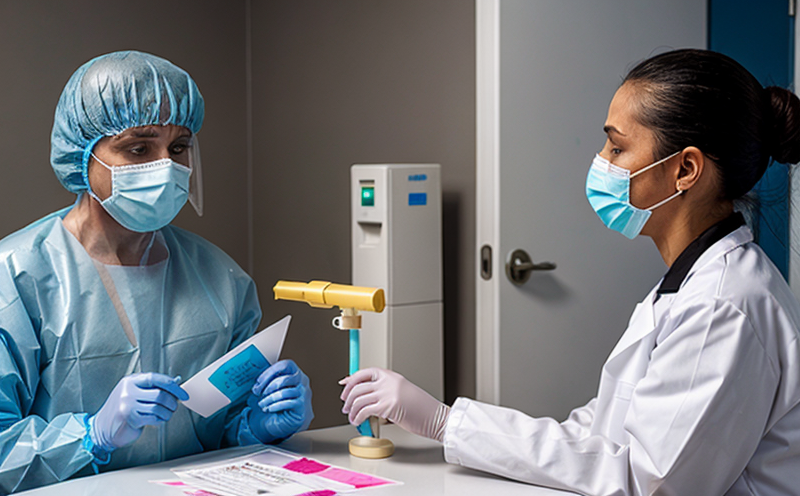Escherichia coli O157:H7 Testing in Meat Products
In the context of meat products, Escherichia coli O157:H7 is a significant pathogen that can cause severe health issues including bloody diarrhea, kidney failure, and hemolytic uremic syndrome (HUS). This bacterium primarily affects vulnerable populations such as children, elderly individuals, and those with compromised immune systems. Meat processors are required to ensure the safety of their products by implementing robust testing protocols aimed at detecting E. coli O157:H7 early in the production process.
The presence of this pathogen not only poses a risk to consumer health but also has significant economic implications for the meat industry. Recalls due to contamination can lead to substantial financial losses, damage to brand reputation, and potential legal ramifications. Consequently, laboratories specializing in food testing play a crucial role in ensuring that products meet stringent safety standards set by regulatory bodies such as the Food and Drug Administration (FDA) and the World Health Organization (WHO).
The methodology for detecting E. coli O157:H7 involves several key steps, which we will detail later in this section. These methods are designed to be sensitive enough to identify even trace amounts of the pathogen while minimizing false positives. The goal is to provide accurate and reliable results that can guide corrective actions if contamination is detected.
The importance of accurate testing cannot be overstated, especially given the public health concerns associated with this strain. By adhering to best practices in laboratory procedures, meat processors can help maintain consumer trust and ensure compliance with international standards such as ISO 16865-3:2019 and EN ISO/IEC 17025.
Our laboratory services cater specifically to the needs of the meat industry, offering comprehensive testing solutions that include not only E. coli O157:H7 detection but also other relevant pathogens such as Salmonella spp., Listeria monocytogenes, and Campylobacter jejuni. Our team of experts is dedicated to providing timely results that support your quality assurance initiatives.
The demand for safe meat products has never been higher, driven by increased consumer awareness and stricter regulatory requirements worldwide. By partnering with a leading laboratory like ours, you can rest assured that your products meet the highest safety standards and comply with all relevant regulations.
Why It Matters
The detection of E. coli O157:H7 in meat products is critical for several reasons:
- Public Health Concerns: This strain of E. coli can lead to severe illness, including hemolytic uremic syndrome (HUS), which can result in kidney failure.
- Economic Impact: Contaminated products often require costly recalls and can damage brand reputation.
- Regulatory Compliance: Failure to meet regulatory standards can lead to legal penalties and fines.
- Consumer Trust: Ensuring product safety builds trust with consumers, leading to increased customer loyalty.
The stakes are high when it comes to meat safety. A single outbreak of E. coli O157:H7 can have far-reaching consequences, affecting not only individual consumers but entire industries and economies.
Scope and Methodology
| Step | Description |
|---|---|
| Sample Collection: | Meat samples are collected from various parts of the production line, ensuring a representative sample. |
| Preparation: | The meat samples undergo homogenization and dilution to facilitate accurate analysis. |
| Culture: | A selective media is used to grow E. coli O157:H7, distinguishing it from other strains. |
| Confirmation: | PCR and serological tests are employed to confirm the presence of specific antigens or nucleic acids. |
The process is designed to be both sensitive and specific, ensuring accurate identification of E. coli O157:H7. This approach aligns with international standards such as ISO 16865-3:2019, which outlines best practices for detecting foodborne pathogens.
Benefits
- Improved Product Safety: Early detection allows for prompt corrective actions to prevent contamination.
- Enhanced Brand Reputation: Compliance with rigorous testing protocols builds consumer trust and loyalty.
- Avoidance of Legal Issues: Meeting regulatory standards reduces the risk of legal penalties and fines.
- Cost Savings: Preventive measures can save significant costs associated with product recalls.
- Compliance with Standards: Testing aligns your processes with international best practices, such as ISO/IEC 17025.
- Increased Efficiency: Timely results enable faster decision-making and more efficient production processes.
The benefits of our testing services extend beyond just meeting regulatory requirements. By partnering with us, you can enhance your product safety, protect your brand, and ensure compliance with international standards.





